
xllm
A high-performance inference engine for LLMs, optimized for diverse AI accelerators.
Stars: 462
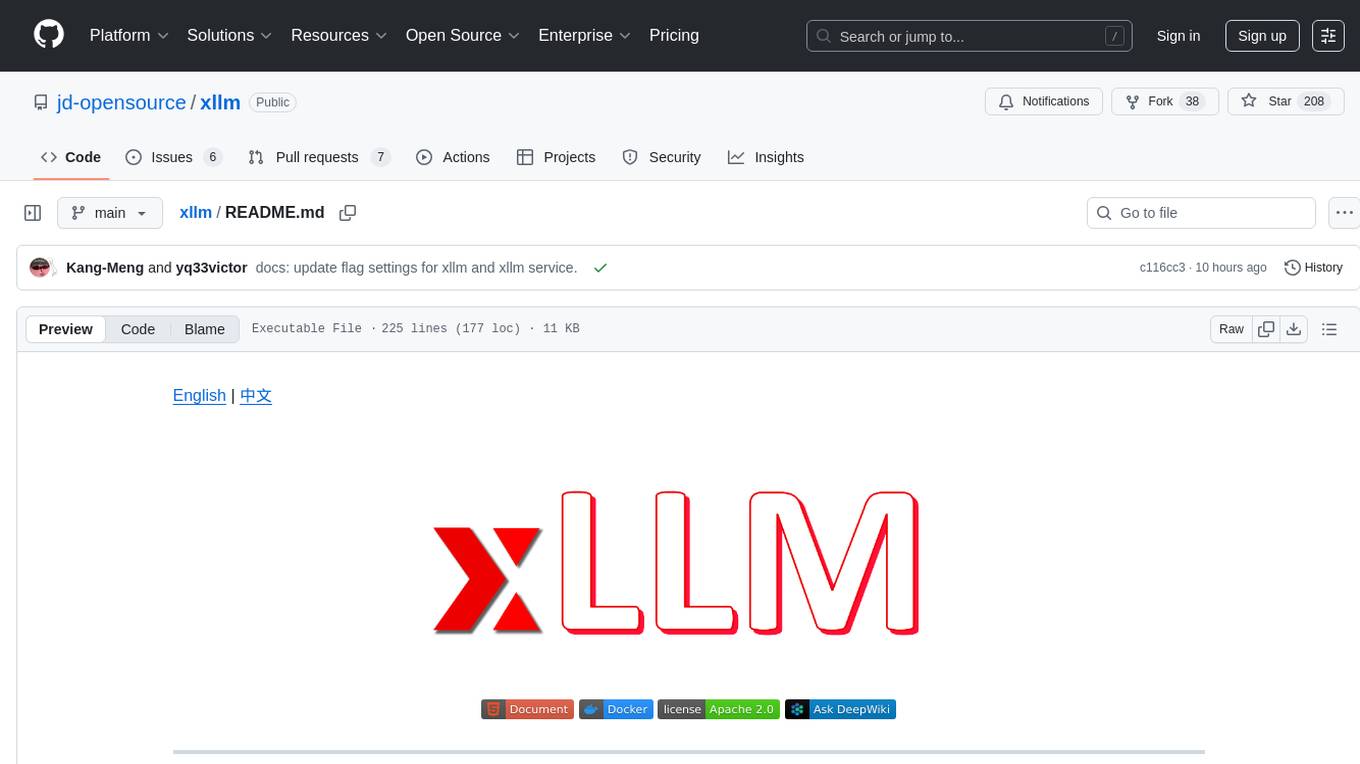
xLLM is an efficient LLM inference framework optimized for Chinese AI accelerators, enabling enterprise-grade deployment with enhanced efficiency and reduced cost. It adopts a service-engine decoupled inference architecture, achieving breakthrough efficiency through technologies like elastic scheduling, dynamic PD disaggregation, multi-stream parallel computing, graph fusion optimization, and global KV cache management. xLLM supports deployment of mainstream large models on Chinese AI accelerators, empowering enterprises in scenarios like intelligent customer service, risk control, supply chain optimization, ad recommendation, and more.
README:
| Documentation |
xLLM is an efficient LLM inference framework, specifically optimized for Chinese AI accelerators, enabling enterprise-grade deployment with enhanced efficiency and reduced cost. The framework adopts a service-engine decoupled inference architecture, achieving breakthrough efficiency through several technologies: at the service layer, including elastic scheduling of online/offline requests, dynamic PD disaggregation, a hybrid EPD mechanism for multimodal and high-availability fault tolerance; and at the engine layer, combined with technologies such as multi-stream parallel computing, graph fusion optimization, speculative inference, dynamic load balancing and global KV cache management. The overall architecture is shown below:
xLLM already supports efficient deployment of mainstream large models (such as DeepSeek-V3.1, Qwen2/3, etc.) on Chinese AI accelerators, empowering enterprises to implement high-performance, low-cost AI large model applications. xLLM has been fully deployed in JD.com’s real core retail businesses, covering a variety of scenarios including intelligent customer service, risk control, supply chain optimization, ad recommendation, and more.
xLLM delivers robust intelligent computing capabilities. By leveraging hardware system optimization and algorithm-driven decision control, it jointly accelerates the inference process, enabling high-throughput, low-latency distributed inference services.
Full Graph Pipeline Execution Orchestration
- Asynchronous decoupled scheduling at the requests scheduling layer, to reduce computational bubbles.
- Asynchronous parallelism of computation and communication at the model graph layer, overlapping computation and communication.
- Pipelining of heterogeneous computing units at the operator kernel layer, overlapping computation and memory access.
Graph Optimization for Dynamic Shapes
- Dynamic shape adaptation based on parameterization and multi-graph caching methods to enhance the flexibility of static graph.
- Controlled tensor memory pool to ensure address security and reusability.
- Integration and adaptation of performance-critical custom operators (e.g., PageAttention, AllReduce).
Efficient Memory Optimization
- Mapping management between discrete physical memory and continuous virtual memory.
- On-demand memory allocation to reduce memory fragmentation.
- Intelligent scheduling of memory pages to increase memory reusability.
- Adaptation of corresponding operators for domestic accelerators.
Global KV Cache Management
- Intelligent offloading and prefetching of KV in hierarchical caches.
- KV cache-centric distributed storage architecture.
- Intelligent KV routing among computing nodes.
Algorithm-driven Acceleration
- Speculative decoding optimization to improve efficiency through multi-core parallelism.
- Dynamic load balancing of MoE experts to achieve efficient adjustment of expert distribution.
├── xllm/
| : main source folder
│ ├── api_service/ # code for api services
│ ├── core/
│ │ : xllm core features folder
│ │ ├── common/
│ │ ├── distributed_runtime/ # code for distributed and pd serving
│ │ ├── framework/ # code for execution orchestration
│ │ ├── kernels/ # adaption for npu kernels adaption
│ │ ├── layers/ # model layers impl
│ │ ├── runtime/ # code for worker and executor
│ │ ├── scheduler/ # code for batch and pd scheduler
│ │ └── util/
│ ├── models/ # models impl
│ ├── processors/ # code for vlm pre-processing
│ ├── proto/ # communication protocol
| └── server/ # xLLM server
├── examples/ # examples of calling xLLM
├── tools/ # code for npu time generations
└── xllm.cpp # entrypoint of xLLM
Supported models list:
- DeepSeek-V3/R1
- DeepSeek-R1-Distill-Qwen
- Kimi-k2
- Llama2/3
- MiniCPM-V
- MiMo-VL
- Qwen2/2.5/QwQ
- Qwen2.5-VL
- Qwen3 / Qwen3-MoE
First, download the image we provide:
# A2 x86
docker pull xllm/xllm-ai:xllm-0.6.0-dev-hb-rc2-py3.11-oe24.03-lts
# A2 arm
docker pull xllm/xllm-ai:xllm-0.6.0-dev-hb-rc2-py3.11-oe24.03-lts-aarch64
# A3 arm
docker pull xllm/xllm-ai:xllm-0.6.0-dev-hc-rc2-py3.11-oe24.03-lts-aarch64
# or
# A2 x86
docker pull quay.io/jd_xllm/xllm-ai:0.6.0-dev-hb-rc2-x86
# A2 arm
docker pull quay.io/jd_xllm/xllm-ai:0.6.0-dev-hb-rc2-arm
# A3 arm
docker pull quay.io/jd_xllm/xllm-ai:0.6.0-dev-hc-rc2-armThen create the corresponding container:
sudo docker run -it --ipc=host -u 0 --privileged --name mydocker --network=host --device=/dev/davinci0 --device=/dev/davinci_manager --device=/dev/devmm_svm --device=/dev/hisi_hdc -v /var/queue_schedule:/var/queue_schedule -v /usr/local/Ascend/driver:/usr/local/Ascend/driver -v /usr/local/Ascend/add-ons/:/usr/local/Ascend/add-ons/ -v /usr/local/sbin/npu-smi:/usr/local/sbin/npu-smi -v /usr/local/sbin/:/usr/local/sbin/ -v /var/log/npu/conf/slog/slog.conf:/var/log/npu/conf/slog/slog.conf -v /var/log/npu/slog/:/var/log/npu/slog -v /export/home:/export/home -w /export/home -v ~/.ssh:/root/.ssh -v /var/log/npu/profiling/:/var/log/npu/profiling -v /var/log/npu/dump/:/var/log/npu/dump -v /home/:/home/ -v /runtime/:/runtime/ xllm/xllm-ai:xllm-0.6.0-dev-hb-rc2-py3.11-oe24.03-ltsInstall official repo and submodules:
git clone https://github.com/jd-opensource/xllm
cd xllm
git submodule init
git submodule updateThe compilation depends on vcpkg. The Docker image already includes VCPKG_ROOT preconfigured. If you want to manually set it up, you can:
git clone https://gitcode.com/xLLM-AI/vcpkg.git
cd vcpkg && git checkout ffc42e97c866ce9692f5c441394832b86548422c
export VCPKG_ROOT=/your/path/to/vcpkgInstall python dependencies:
cd xllm
pip install -r cibuild/requirements-dev.txt -i https://mirrors.tuna.tsinghua.edu.cn/pypi/web/simple
pip install --upgrade setuptools wheelWhen compiling, generate executable files build/xllm/core/server/xllm under build/:
python setup.py buildOr, compile directly using the following command to generate the whl package under dist/:
python setup.py bdist_wheelRun the following command to start xLLM engine:
./build/xllm/core/server/xllm \ # launch xllm server
--model=/path/to/your/llm \ # model path(to replace with your own path)
--backend=llm \ # indicate the LLM backend
--port=9977 \ # set service port to 9977
--max_memory_utilization 0.90 # set the maximal utilization of device memoryThere are several ways you can contribute to xLLM:
- Reporting Issues (Bugs & Errors)
- Suggesting Enhancements
- Improving Documentation
- Fork the repository
- Add your view in document
- Send your pull request
- Writing Code
- Fork the repository
- Create a new branch
- Add your feature or improvement
- Send your pull request
We appreciate all kinds of contributions! 🎉🎉🎉 If you have problems about development, please check our document: Document
If you encounter any issues along the way, you are welcomed to submit reproducible steps and log snippets in the project's Issues area, or contact the xLLM Core team directly via your internal Slack. Moreover, we have established a WeChat user group. You can find our group chat QR code image here or visit the following live QR code. Welcome to contact us!
This project was made possible thanks to the following open-source projects:
- ScaleLLM - xLLM draws inspiration from ScaleLLM's graph construction method and references its runtime execution.
- Mooncake - Build xLLM hybrid KV cache management based on Mooncake.
- brpc - Build high-performance http service based on brpc.
- tokenizers-cpp - Build C++ tokenizer based on tokenizers-cpp.
- safetensors - xLLM relies on the C binding safetensors capability.
- Partial JSON Parser - Implement xLLM's C++ JSON parser with insights from Python and Go implementations.
- concurrentqueue - A fast multi-producer, multi-consumer lock-free concurrent queue for C++11.
Thanks to the following collaborating university laboratories:
- THU-MIG (School of Software, BNRist, Tsinghua University)
- USTC-Cloudlab (Cloud Computing Lab, University of Science and Technology of China)
- Beihang-HiPO (Beihang HiPO research group)
- PKU-DS-LAB (Data Structure Laboratory, Peking University)
- PKU-NetSys-LAB (NetSys Lab, Peking University)
Thanks to all the following developers who have contributed to xLLM.
For Tasks:
Click tags to check more tools for each tasksFor Jobs:
Alternative AI tools for xllm
Similar Open Source Tools

xllm
xLLM is an efficient LLM inference framework optimized for Chinese AI accelerators, enabling enterprise-grade deployment with enhanced efficiency and reduced cost. It adopts a service-engine decoupled inference architecture, achieving breakthrough efficiency through technologies like elastic scheduling, dynamic PD disaggregation, multi-stream parallel computing, graph fusion optimization, and global KV cache management. xLLM supports deployment of mainstream large models on Chinese AI accelerators, empowering enterprises in scenarios like intelligent customer service, risk control, supply chain optimization, ad recommendation, and more.
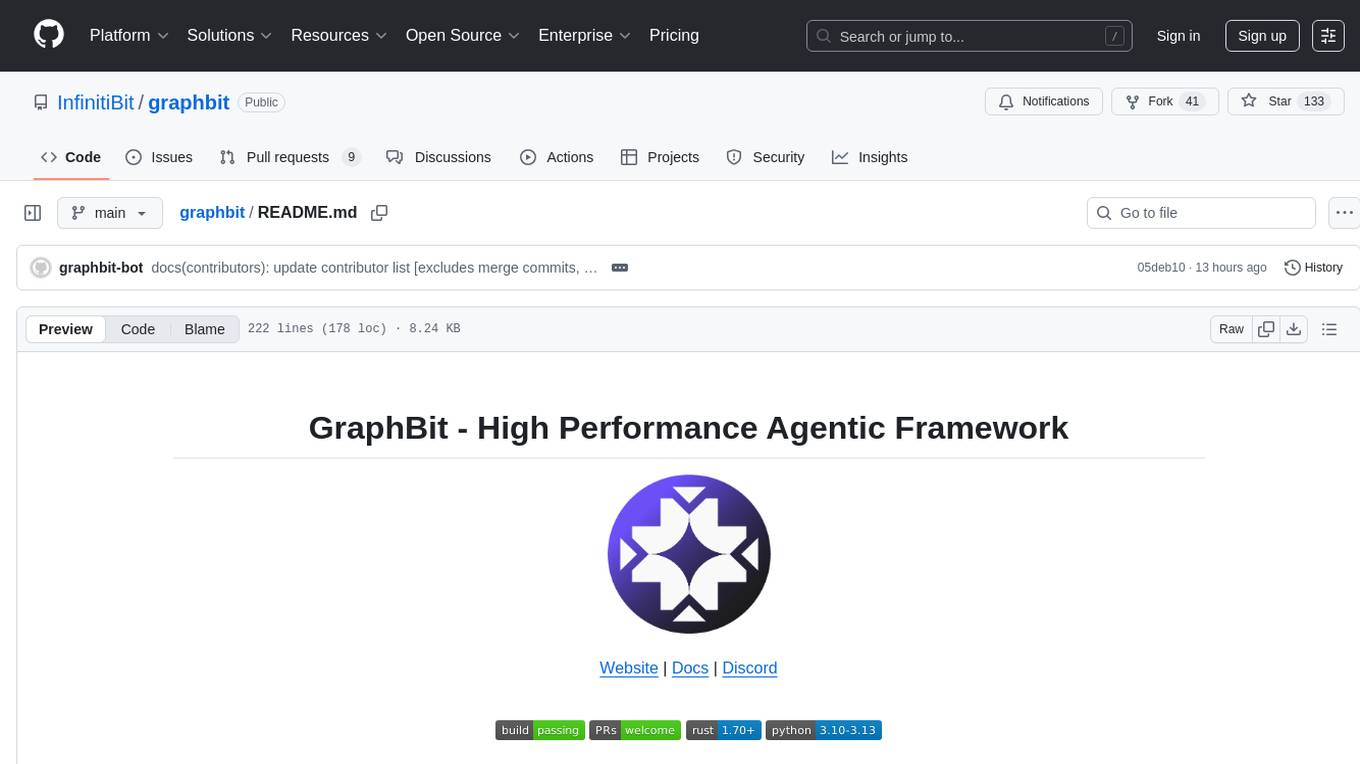
graphbit
GraphBit is an industry-grade agentic AI framework built for developers and AI teams that demand stability, scalability, and low resource usage. It is written in Rust for maximum performance and safety, delivering significantly lower CPU usage and memory footprint compared to leading alternatives. The framework is designed to run multi-agent workflows in parallel, persist memory across steps, recover from failures, and ensure 100% task success under load. With lightweight architecture, observability, and concurrency support, GraphBit is suitable for deployment in high-scale enterprise environments and low-resource edge scenarios.
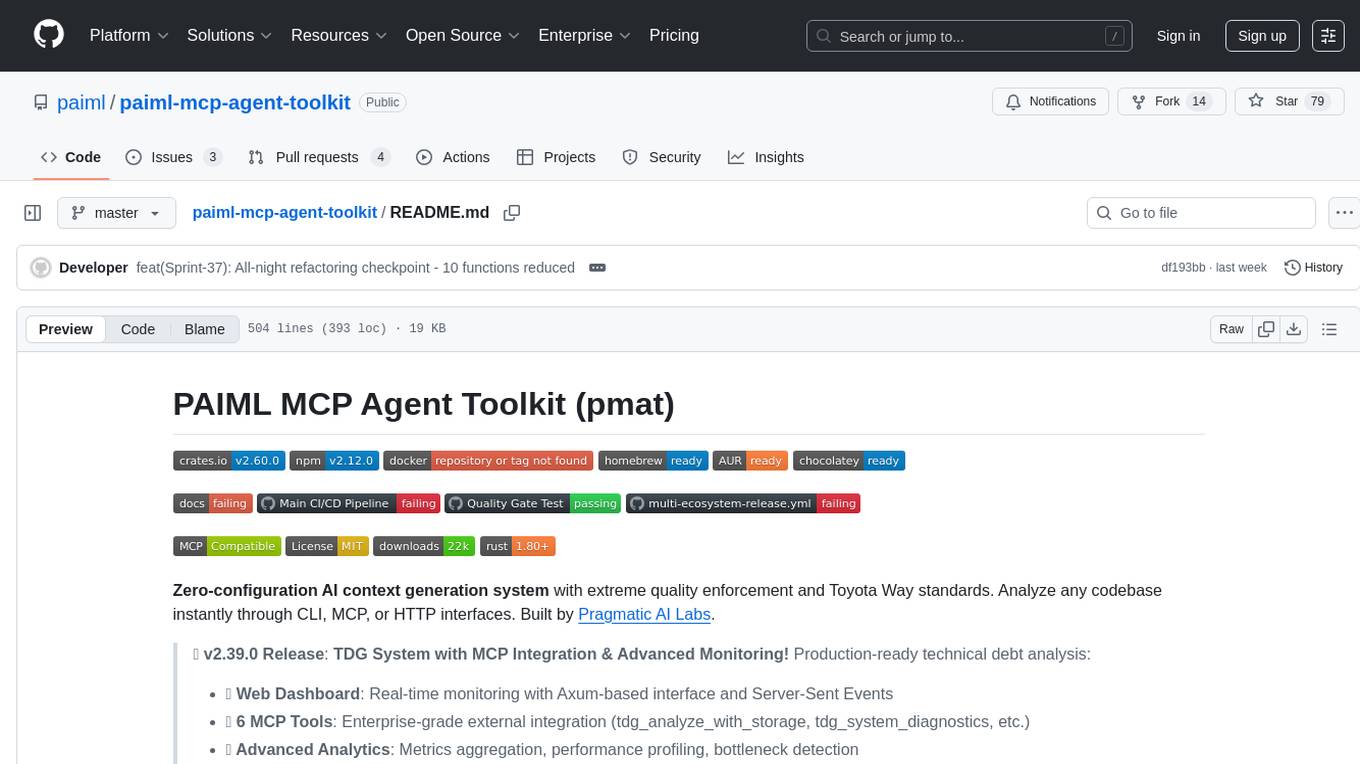
paiml-mcp-agent-toolkit
PAIML MCP Agent Toolkit (PMAT) is a zero-configuration AI context generation system with extreme quality enforcement and Toyota Way standards. It allows users to analyze any codebase instantly through CLI, MCP, or HTTP interfaces. The toolkit provides features such as technical debt analysis, advanced monitoring, metrics aggregation, performance profiling, bottleneck detection, alert system, multi-format export, storage flexibility, and more. It also offers AI-powered intelligence for smart recommendations, polyglot analysis, repository showcase, and integration points. PMAT enforces quality standards like complexity ≤20, zero SATD comments, test coverage >80%, no lint warnings, and synchronized documentation with commits. The toolkit follows Toyota Way development principles for iterative improvement, direct AST traversal, automated quality gates, and zero SATD policy.
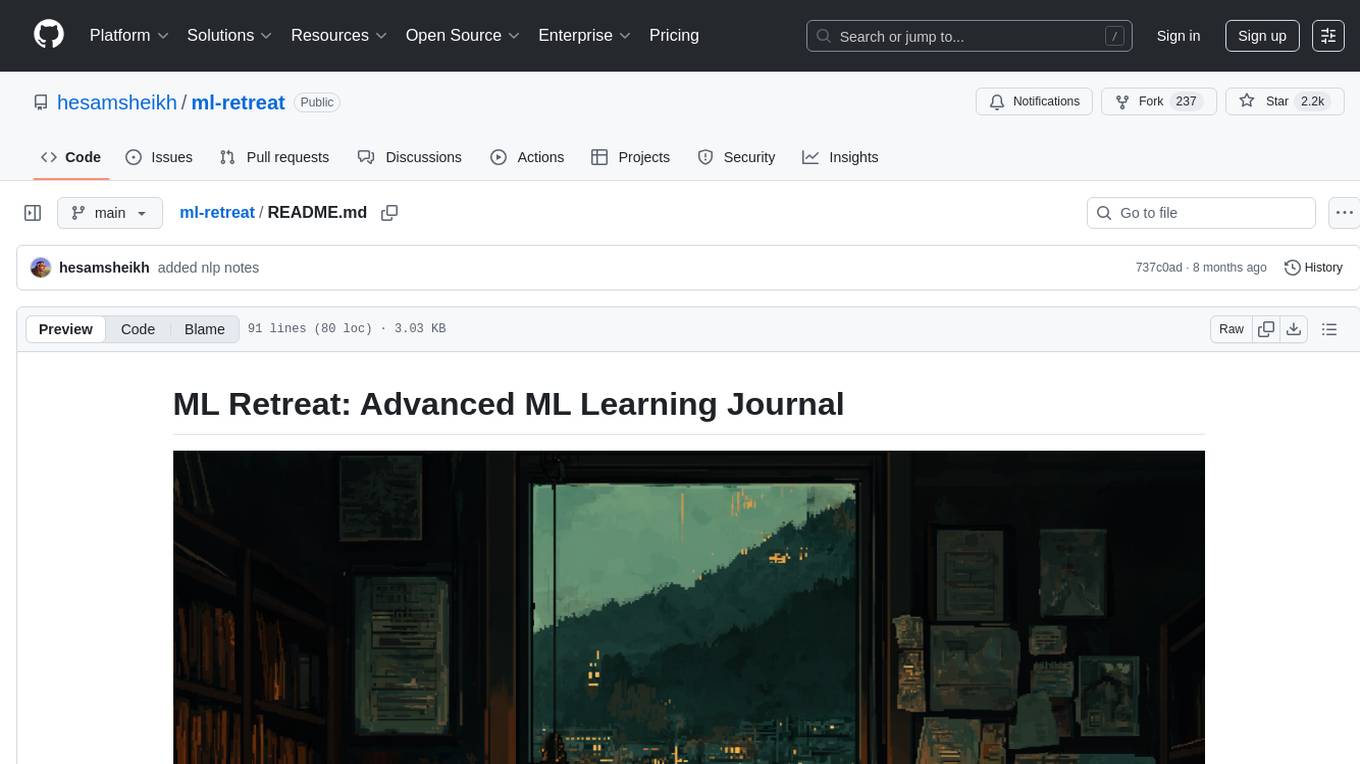
ml-retreat
ML-Retreat is a comprehensive machine learning library designed to simplify and streamline the process of building and deploying machine learning models. It provides a wide range of tools and utilities for data preprocessing, model training, evaluation, and deployment. With ML-Retreat, users can easily experiment with different algorithms, hyperparameters, and feature engineering techniques to optimize their models. The library is built with a focus on scalability, performance, and ease of use, making it suitable for both beginners and experienced machine learning practitioners.
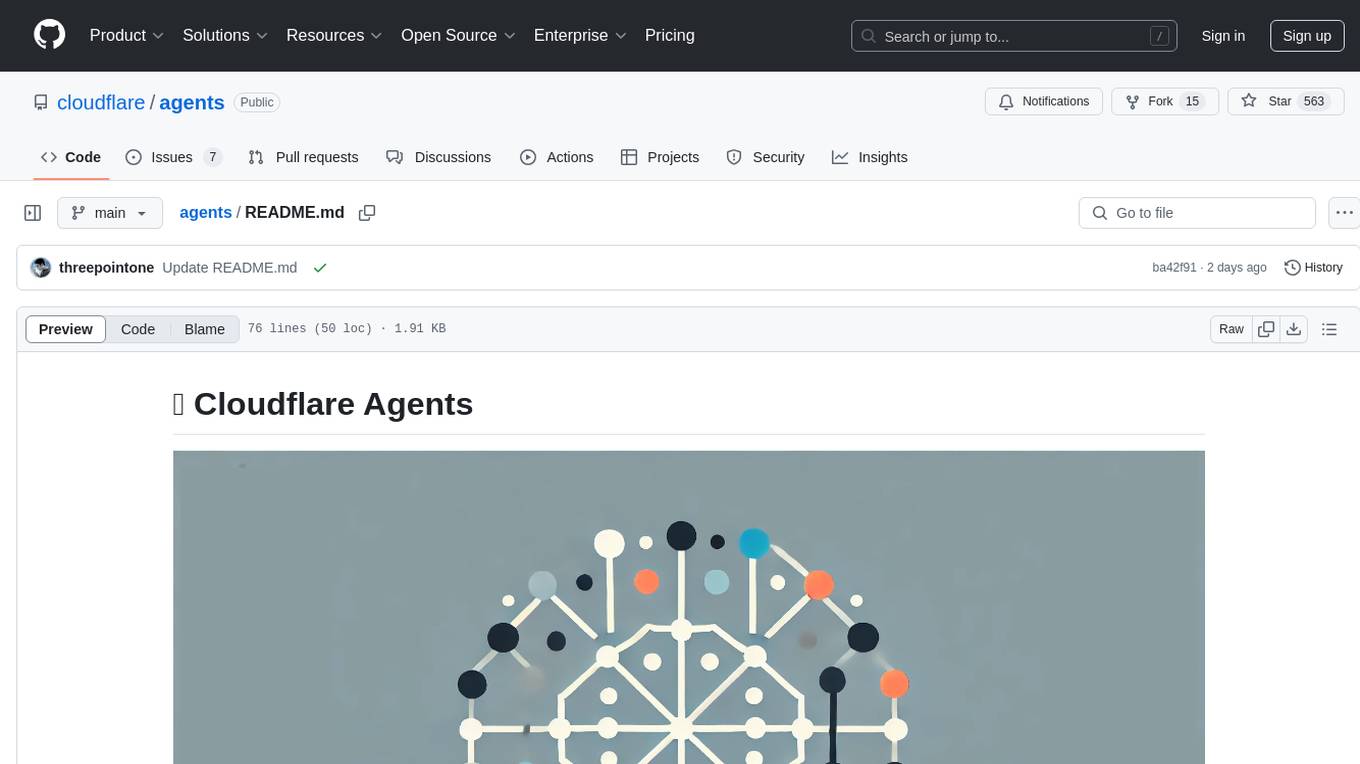
agents
Cloudflare Agents is a framework for building intelligent, stateful agents that persist, think, and evolve at the edge of the network. It allows for maintaining persistent state and memory, real-time communication, processing and learning from interactions, autonomous operation at global scale, and hibernating when idle. The project is actively evolving with focus on core agent framework, WebSocket communication, HTTP endpoints, React integration, and basic AI chat capabilities. Future developments include advanced memory systems, WebRTC for audio/video, email integration, evaluation framework, enhanced observability, and self-hosting guide.

koog
Koog is a Kotlin-based framework for building and running AI agents entirely in idiomatic Kotlin. It allows users to create agents that interact with tools, handle complex workflows, and communicate with users. Key features include pure Kotlin implementation, MCP integration, embedding capabilities, custom tool creation, ready-to-use components, intelligent history compression, powerful streaming API, persistent agent memory, comprehensive tracing, flexible graph workflows, modular feature system, scalable architecture, and multiplatform support.
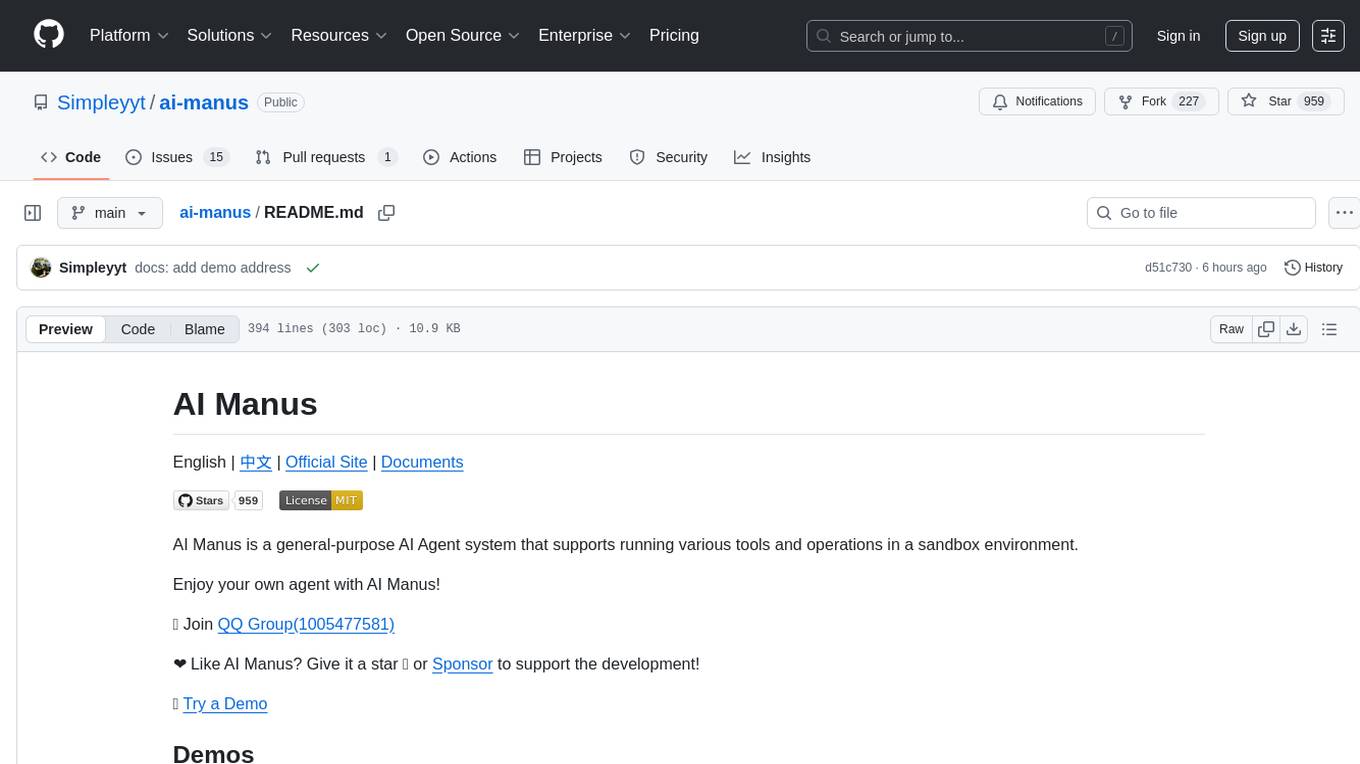
ai-manus
AI Manus is a general-purpose AI Agent system that supports running various tools and operations in a sandbox environment. It offers deployment with minimal dependencies, supports multiple tools like Terminal, Browser, File, Web Search, and messaging tools, allocates separate sandboxes for tasks, manages session history, supports stopping and interrupting conversations, file upload and download, and is multilingual. The system also provides user login and authentication. The project primarily relies on Docker for development and deployment, with model capability requirements and recommended Deepseek and GPT models.
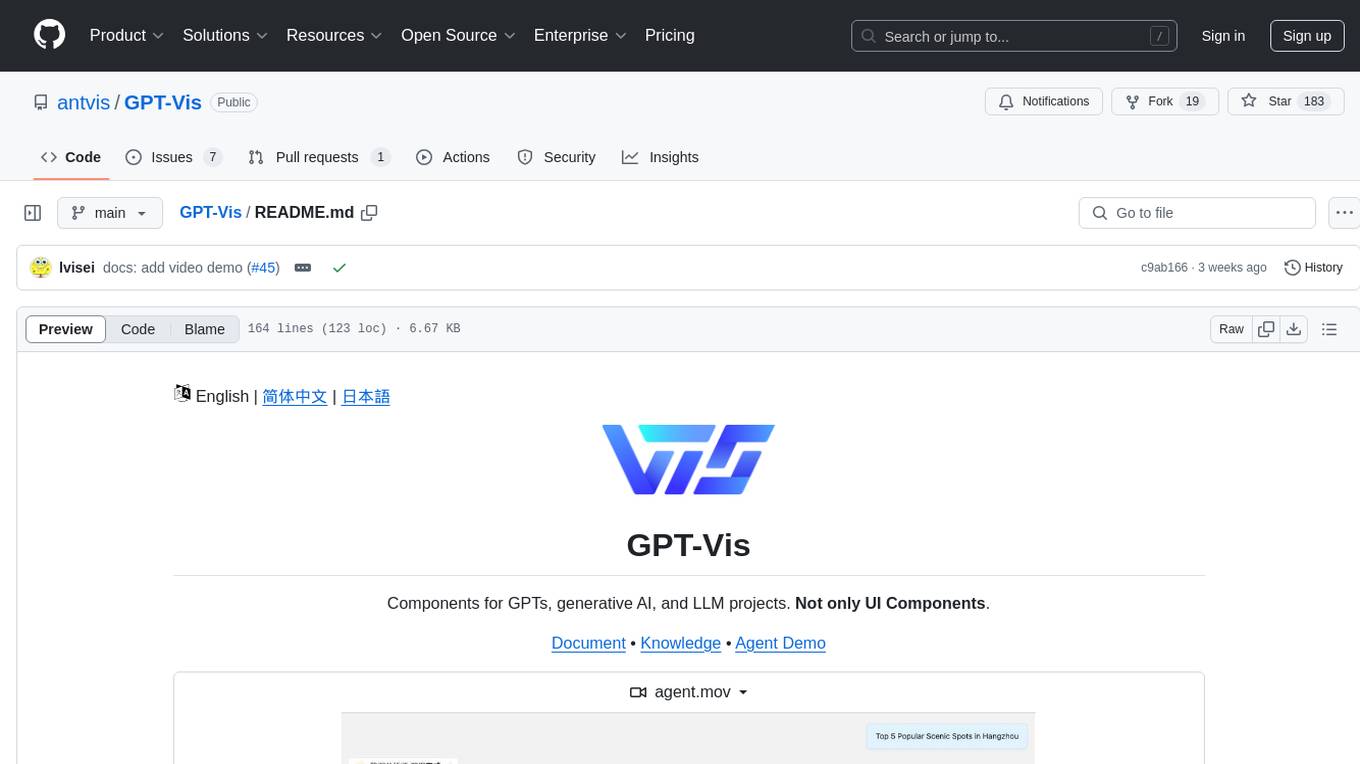
GPT-Vis
GPT-Vis is a tool designed for GPTs, generative AI, and LLM projects. It provides components such as LLM Protocol for conversational interaction, LLM Component for application development, and LLM access for knowledge base and model solutions. The tool aims to facilitate rapid integration into AI applications by offering a visual protocol, built-in components, and chart recommendations for LLM.
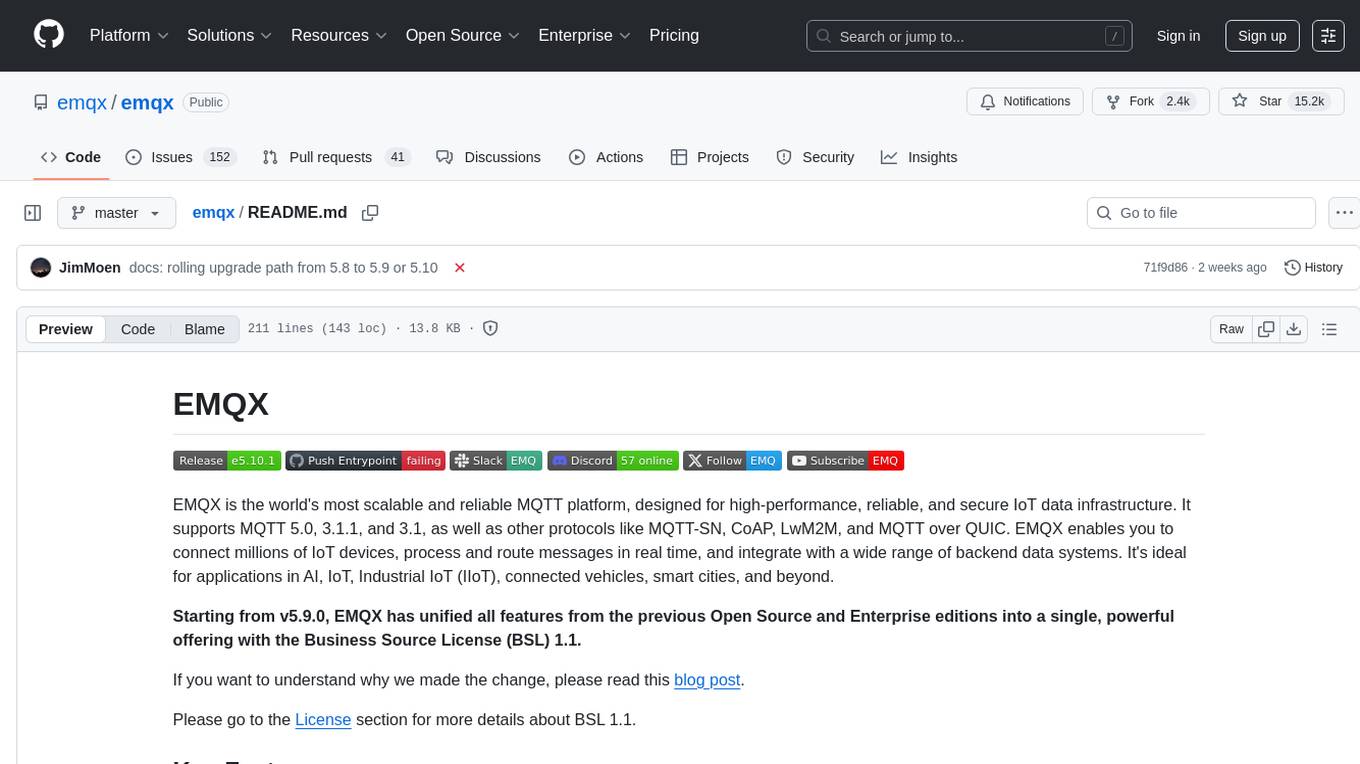
emqx
EMQX is a highly scalable and reliable MQTT platform designed for IoT data infrastructure. It supports various protocols like MQTT 5.0, 3.1.1, and 3.1, as well as MQTT-SN, CoAP, LwM2M, and MQTT over QUIC. EMQX allows connecting millions of IoT devices, processing messages in real time, and integrating with backend data systems. It is suitable for applications in AI, IoT, IIoT, connected vehicles, smart cities, and more. The tool offers features like massive scalability, powerful rule engine, flow designer, AI processing, robust security, observability, management, extensibility, and a unified experience with the Business Source License (BSL) 1.1.
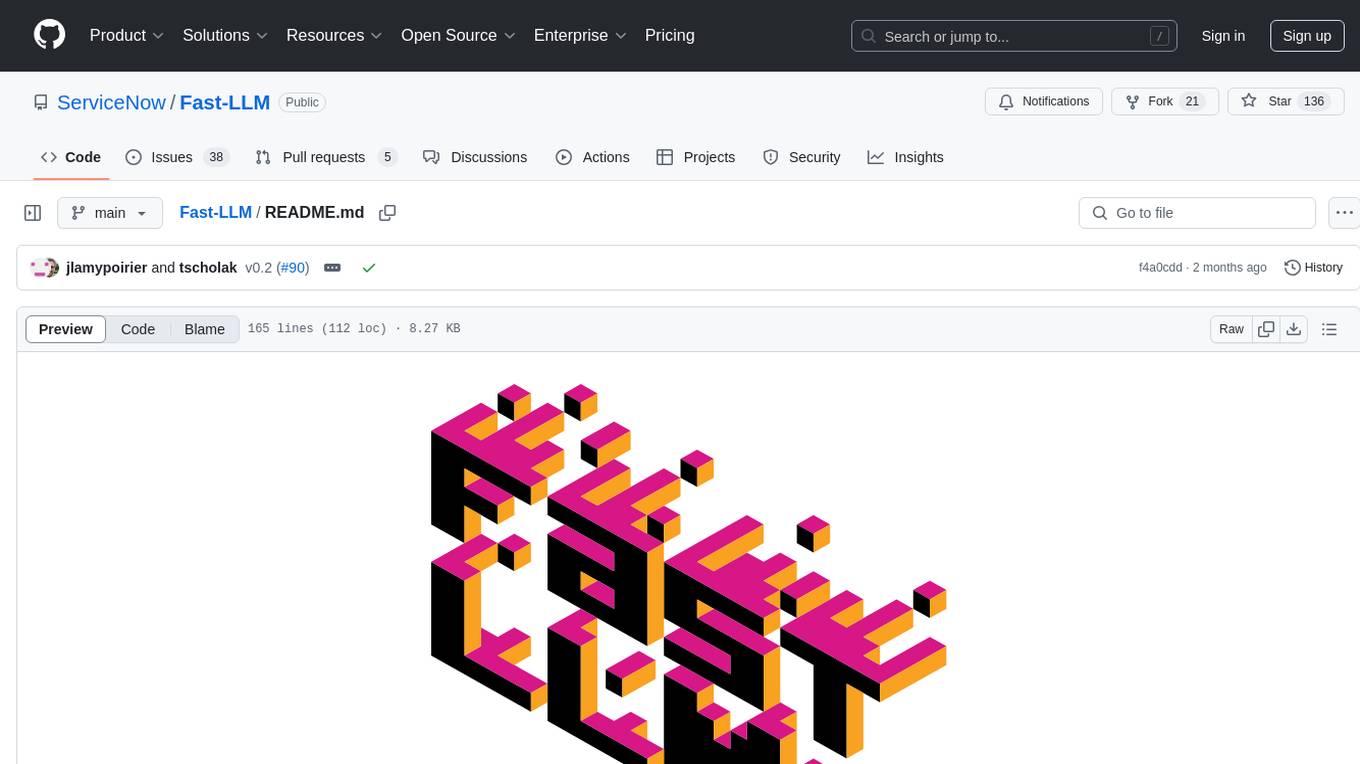
Fast-LLM
Fast-LLM is an open-source library designed for training large language models with exceptional speed, scalability, and flexibility. Built on PyTorch and Triton, it offers optimized kernel efficiency, reduced overheads, and memory usage, making it suitable for training models of all sizes. The library supports distributed training across multiple GPUs and nodes, offers flexibility in model architectures, and is easy to use with pre-built Docker images and simple configuration. Fast-LLM is licensed under Apache 2.0, developed transparently on GitHub, and encourages contributions and collaboration from the community.
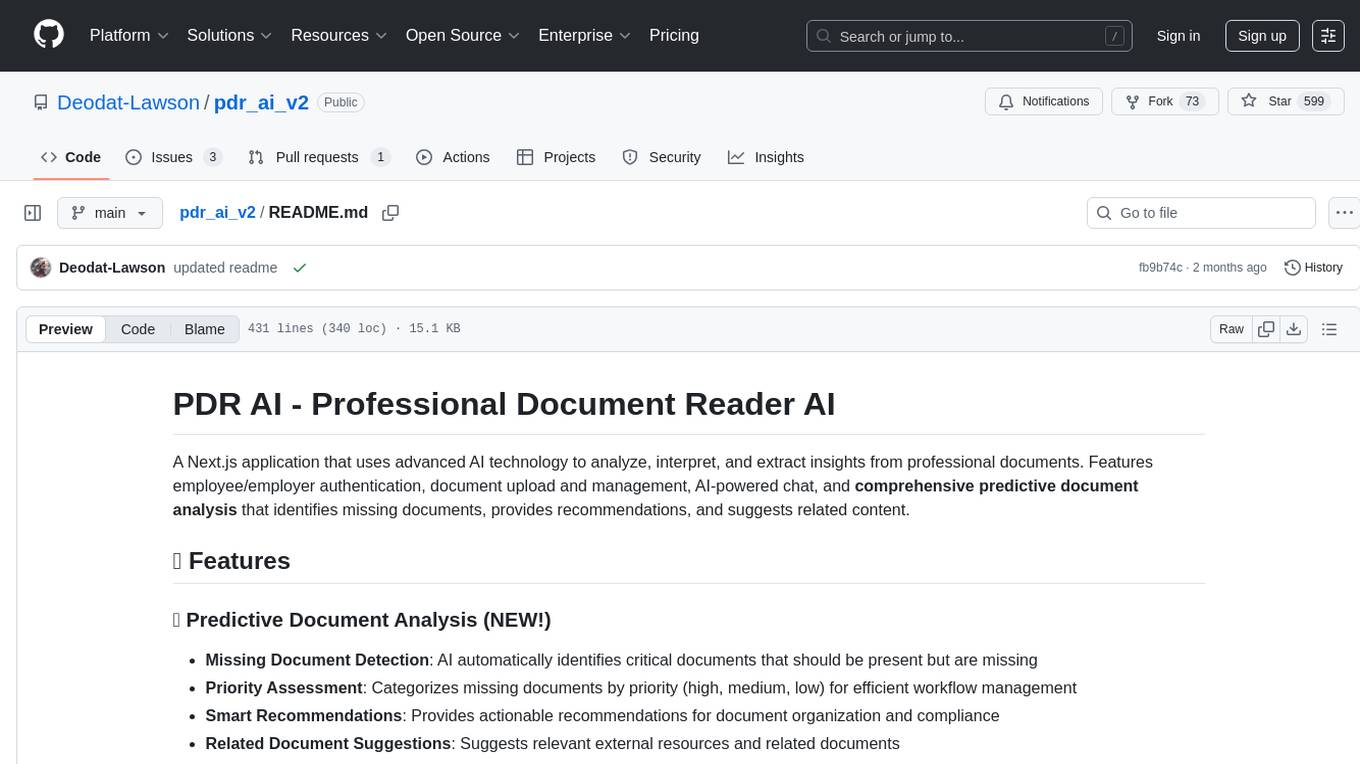
pdr_ai_v2
pdr_ai_v2 is a Python library for implementing machine learning algorithms and models. It provides a wide range of tools and functionalities for data preprocessing, model training, evaluation, and deployment. The library is designed to be user-friendly and efficient, making it suitable for both beginners and experienced data scientists. With pdr_ai_v2, users can easily build and deploy machine learning models for various applications, such as classification, regression, clustering, and more.
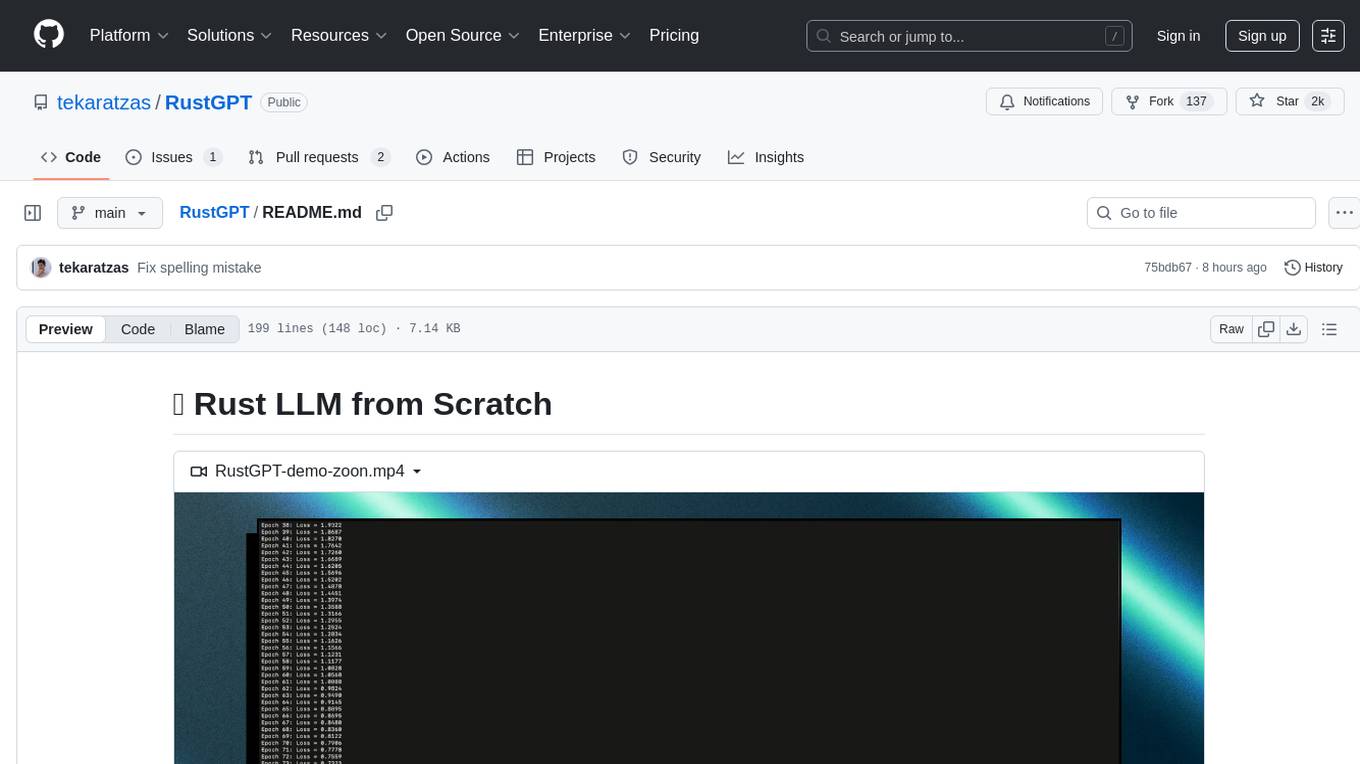
RustGPT
A complete Large Language Model implementation in pure Rust with no external ML frameworks. Demonstrates building a transformer-based language model from scratch, including pre-training, instruction tuning, interactive chat mode, full backpropagation, and modular architecture. Model learns basic world knowledge and conversational patterns. Features custom tokenization, greedy decoding, gradient clipping, modular layer system, and comprehensive test coverage. Ideal for understanding modern LLMs and key ML concepts. Dependencies include ndarray for matrix operations and rand for random number generation. Contributions welcome for model persistence, performance optimizations, better sampling, evaluation metrics, advanced architectures, training improvements, data handling, and model analysis. Follows standard Rust conventions and encourages contributions at beginner, intermediate, and advanced levels.
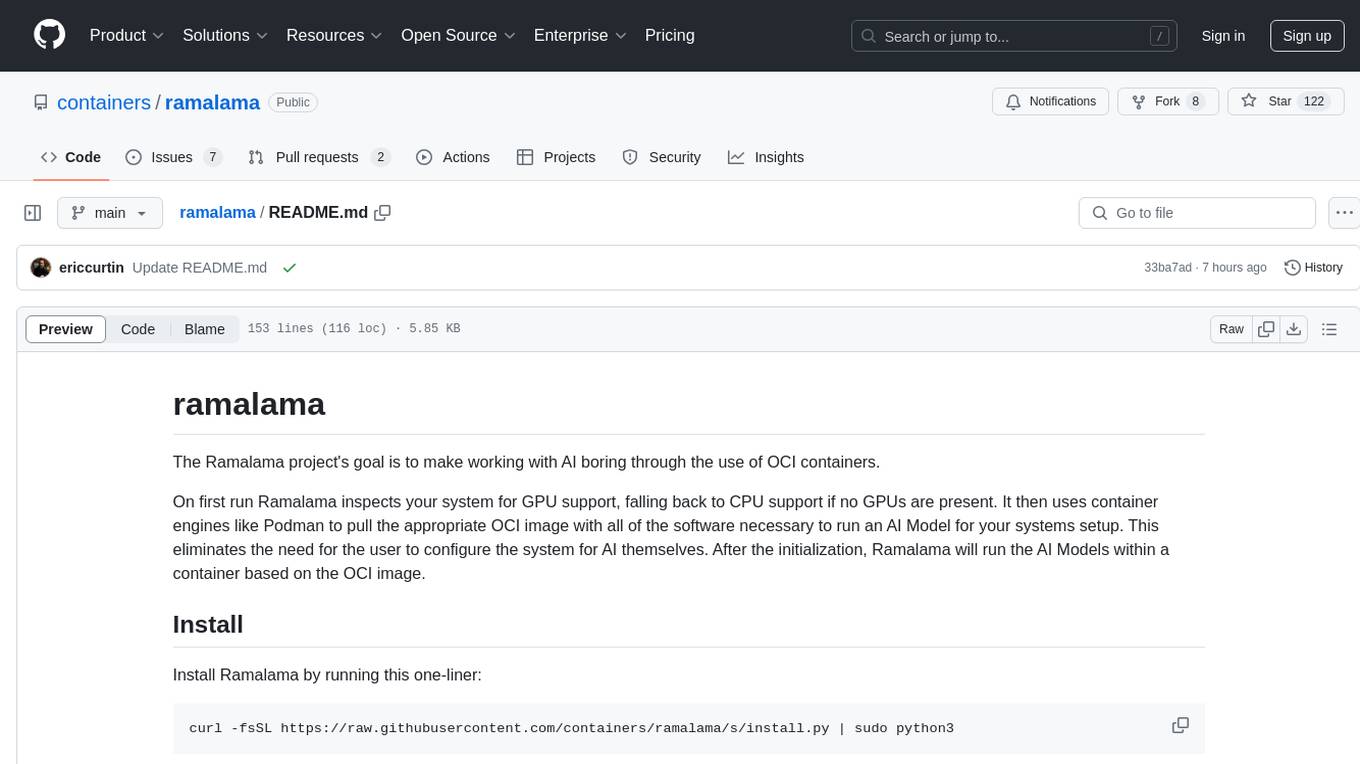
ramalama
The Ramalama project simplifies working with AI by utilizing OCI containers. It automatically detects GPU support, pulls necessary software in a container, and runs AI models. Users can list, pull, run, and serve models easily. The tool aims to support various GPUs and platforms in the future, making AI setup hassle-free.
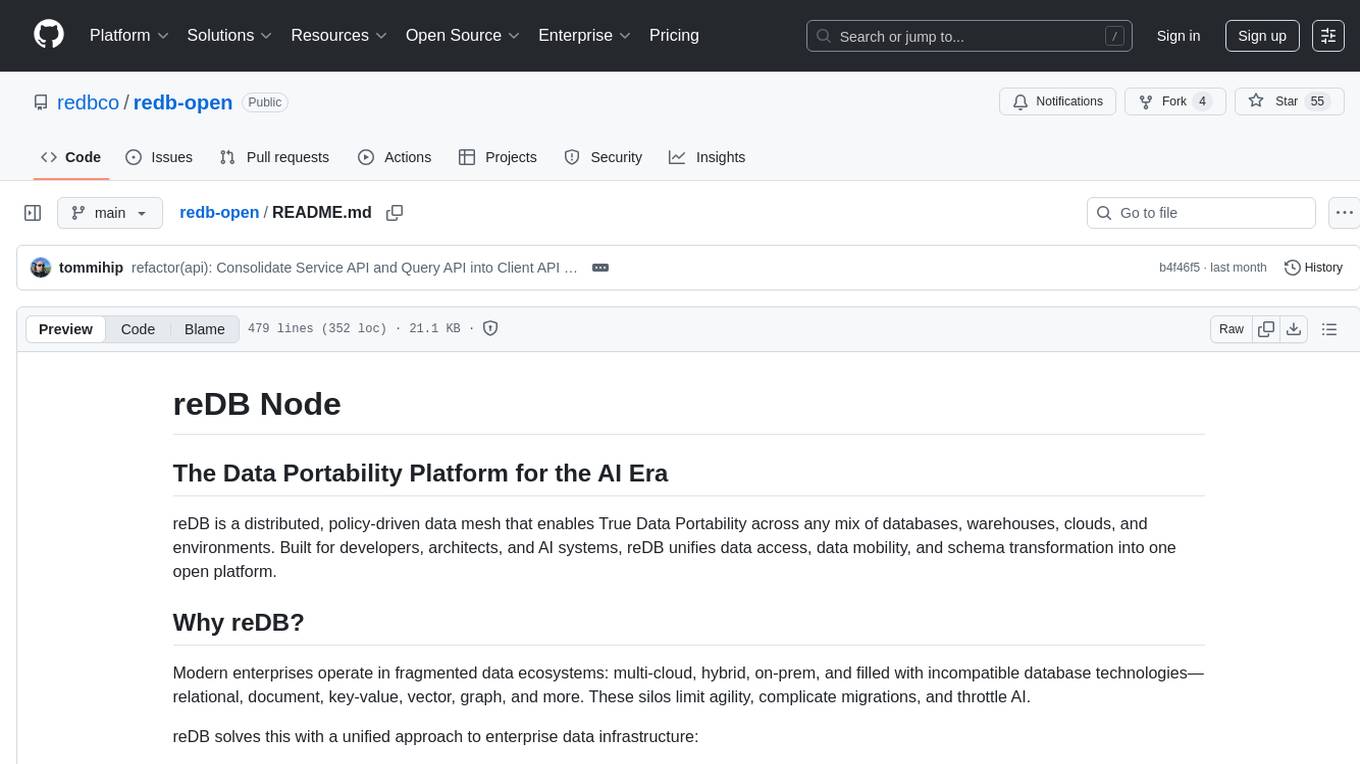
redb-open
reDB Node is a distributed, policy-driven data mesh platform that enables True Data Portability across various databases, warehouses, clouds, and environments. It unifies data access, data mobility, and schema transformation into one open platform. Built for developers, architects, and AI systems, reDB addresses the challenges of fragmented data ecosystems in modern enterprises by providing multi-database interoperability, automated schema versioning, zero-downtime migration, real-time developer data environments with obfuscation, quantum-resistant encryption, and policy-based access control. The project aims to build a foundation for future-proof data infrastructure.
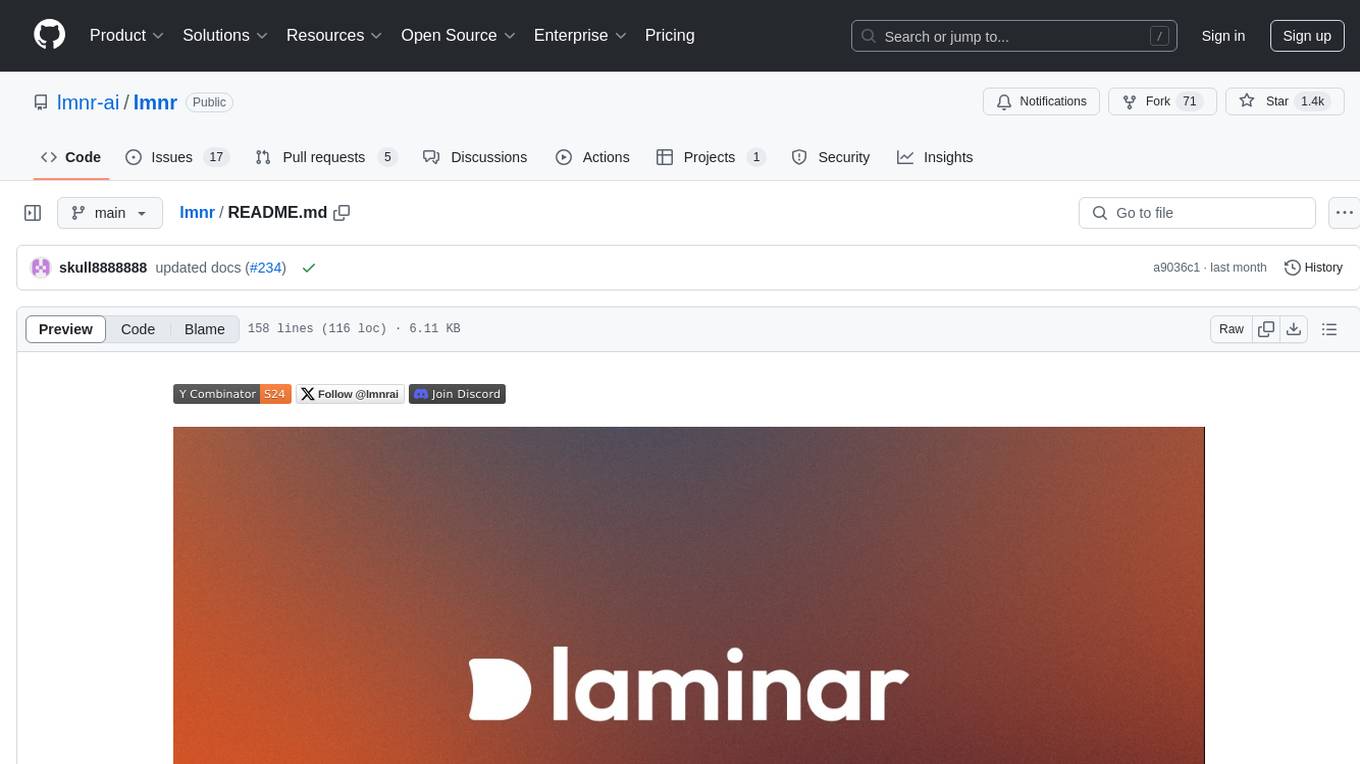
lmnr
Laminar is an all-in-one open-source platform designed for engineering AI products. It allows users to trace, evaluate, label, and analyze LLM data efficiently. The platform offers features such as automatic tracing of common AI frameworks and SDKs, local and online evaluations, simple UI for data labeling, dataset management, and scalability with gRPC communication. Laminar is built with a modern open-source stack including RabbitMQ, Postgres, Clickhouse, and Qdrant for semantic similarity search. It provides fast and beautiful dashboards for traces, evaluations, and labels, making it a comprehensive tool for AI product development.
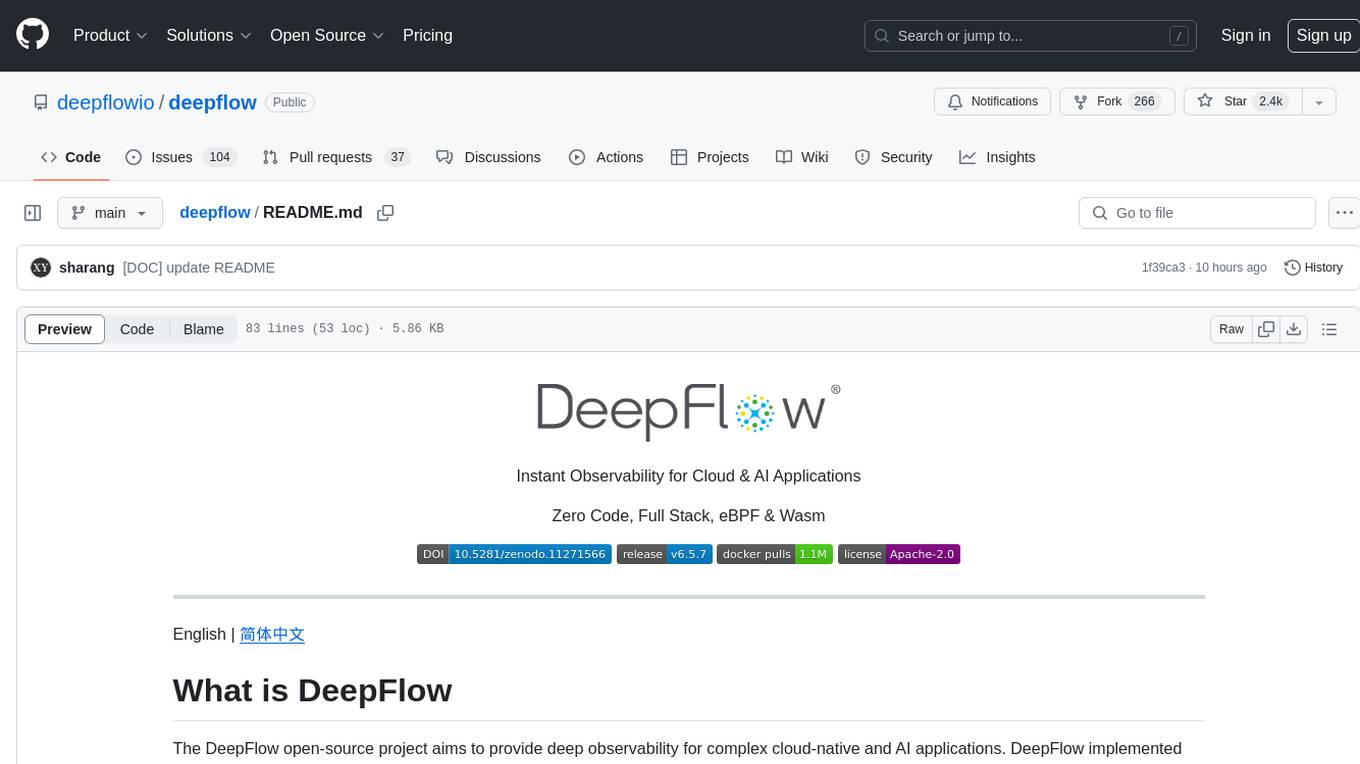
deepflow
DeepFlow is an open-source project that provides deep observability for complex cloud-native and AI applications. It offers Zero Code data collection with eBPF for metrics, distributed tracing, request logs, and function profiling. DeepFlow is integrated with SmartEncoding to achieve Full Stack correlation and efficient access to all observability data. With DeepFlow, cloud-native and AI applications automatically gain deep observability, removing the burden of developers continually instrumenting code and providing monitoring and diagnostic capabilities covering everything from code to infrastructure for DevOps/SRE teams.
For similar tasks

xllm
xLLM is an efficient LLM inference framework optimized for Chinese AI accelerators, enabling enterprise-grade deployment with enhanced efficiency and reduced cost. It adopts a service-engine decoupled inference architecture, achieving breakthrough efficiency through technologies like elastic scheduling, dynamic PD disaggregation, multi-stream parallel computing, graph fusion optimization, and global KV cache management. xLLM supports deployment of mainstream large models on Chinese AI accelerators, empowering enterprises in scenarios like intelligent customer service, risk control, supply chain optimization, ad recommendation, and more.
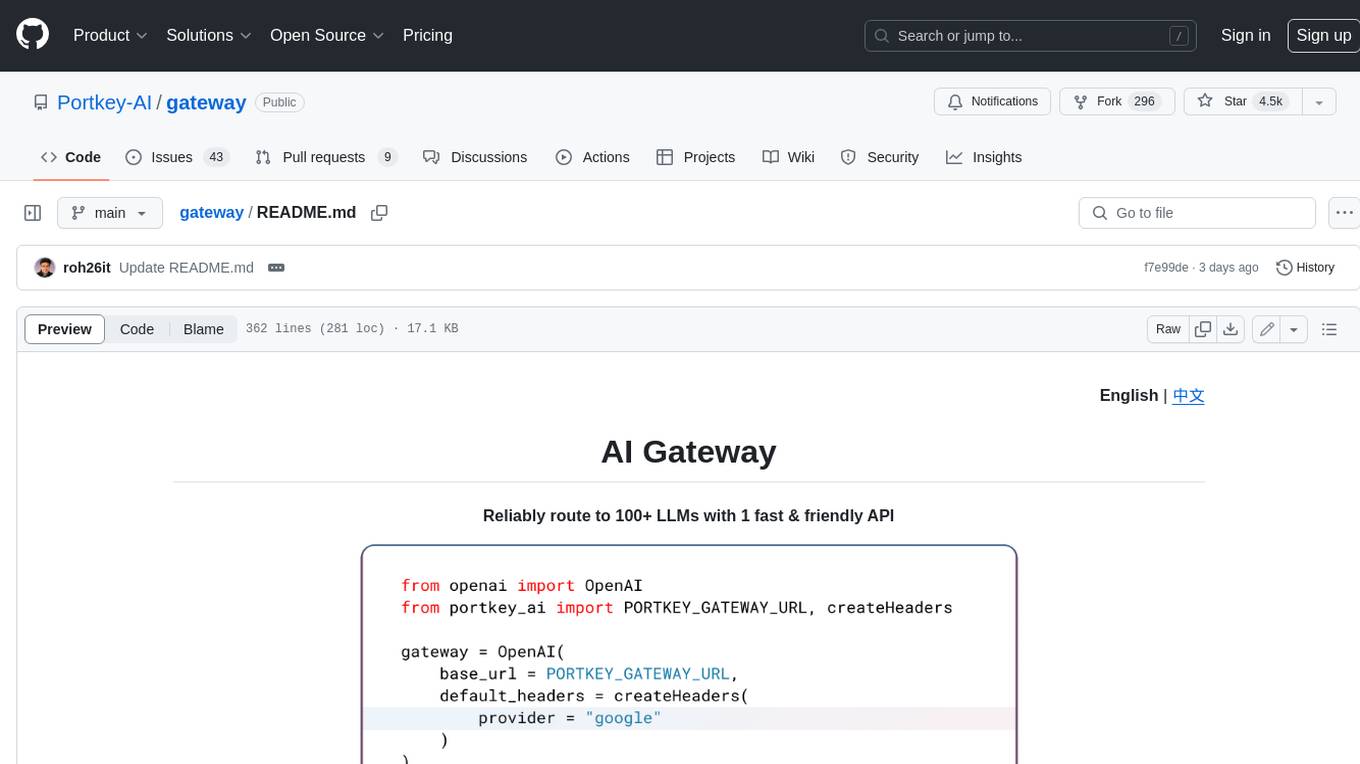
gateway
Gateway is a tool that streamlines requests to 100+ open & closed source models with a unified API. It is production-ready with support for caching, fallbacks, retries, timeouts, load balancing, and can be edge-deployed for minimum latency. It is blazing fast with a tiny footprint, supports load balancing across multiple models, providers, and keys, ensures app resilience with fallbacks, offers automatic retries with exponential fallbacks, allows configurable request timeouts, supports multimodal routing, and can be extended with plug-in middleware. It is battle-tested over 300B tokens and enterprise-ready for enhanced security, scale, and custom deployments.
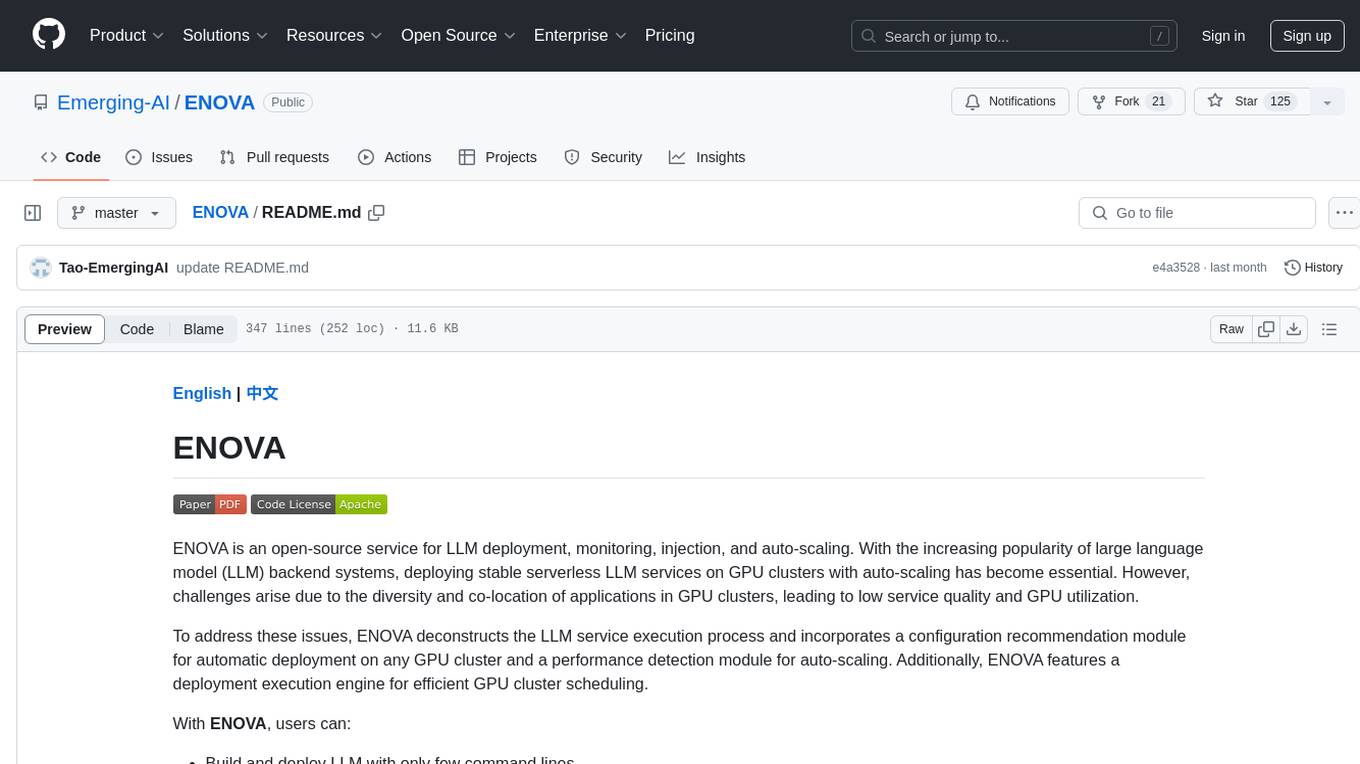
ENOVA
ENOVA is an open-source service for Large Language Model (LLM) deployment, monitoring, injection, and auto-scaling. It addresses challenges in deploying stable serverless LLM services on GPU clusters with auto-scaling by deconstructing the LLM service execution process and providing configuration recommendations and performance detection. Users can build and deploy LLM with few command lines, recommend optimal computing resources, experience LLM performance, observe operating status, achieve load balancing, and more. ENOVA ensures stable operation, cost-effectiveness, efficiency, and strong scalability of LLM services.
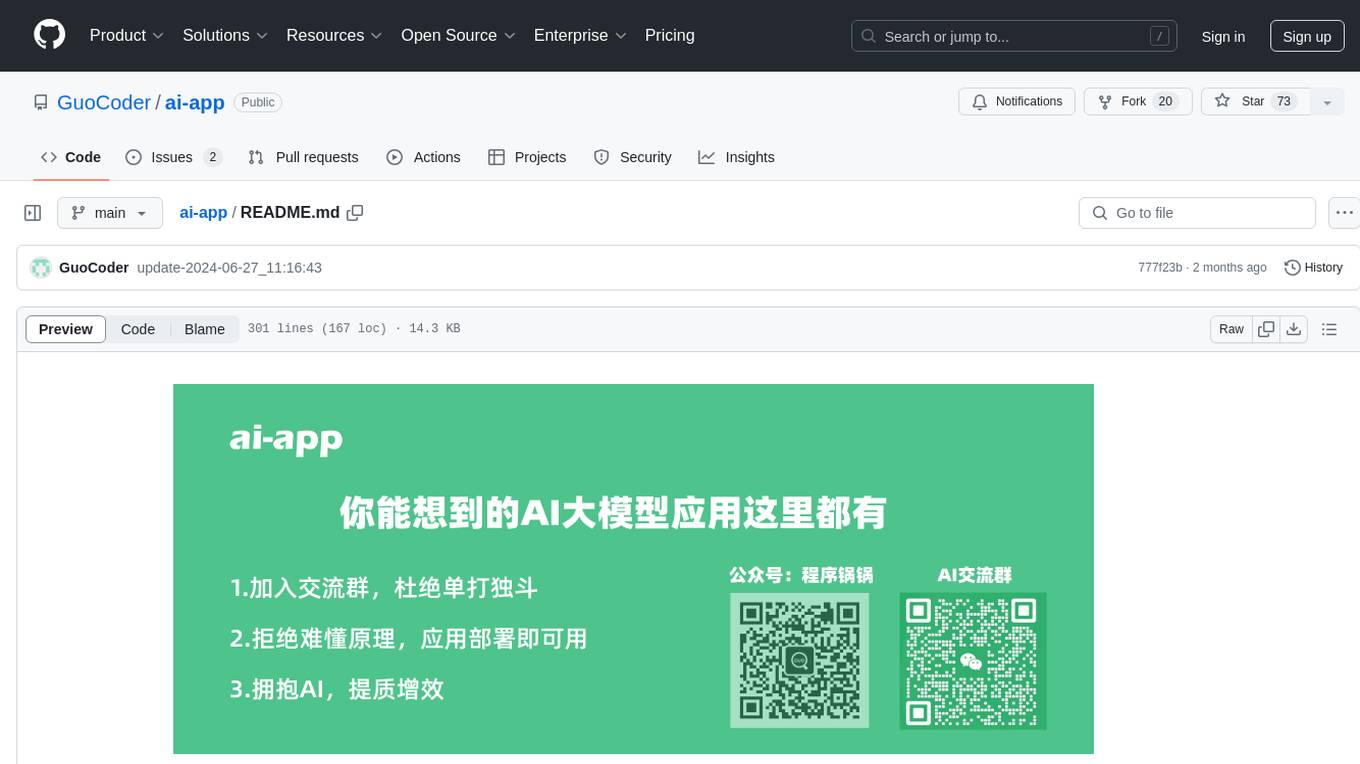
ai-app
The 'ai-app' repository is a comprehensive collection of tools and resources related to artificial intelligence, focusing on topics such as server environment setup, PyCharm and Anaconda installation, large model deployment and training, Transformer principles, RAG technology, vector databases, AI image, voice, and music generation, and AI Agent frameworks. It also includes practical guides and tutorials on implementing various AI applications. The repository serves as a valuable resource for individuals interested in exploring different aspects of AI technology.
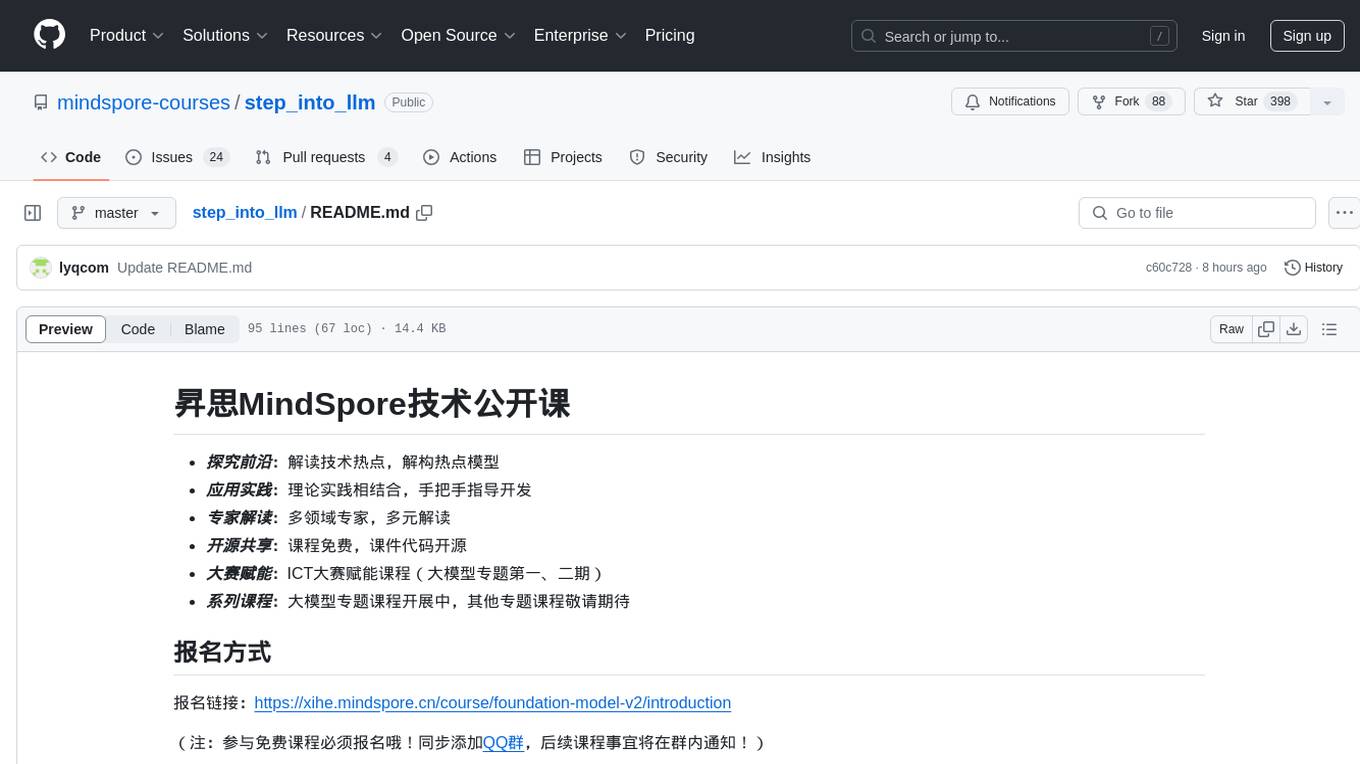
step_into_llm
The 'step_into_llm' repository is dedicated to the 昇思MindSpore technology open class, which focuses on exploring cutting-edge technologies, combining theory with practical applications, expert interpretations, open sharing, and empowering competitions. The repository contains course materials, including slides and code, for the ongoing second phase of the course. It covers various topics related to large language models (LLMs) such as Transformer, BERT, GPT, GPT2, and more. The course aims to guide developers interested in LLMs from theory to practical implementation, with a special emphasis on the development and application of large models.
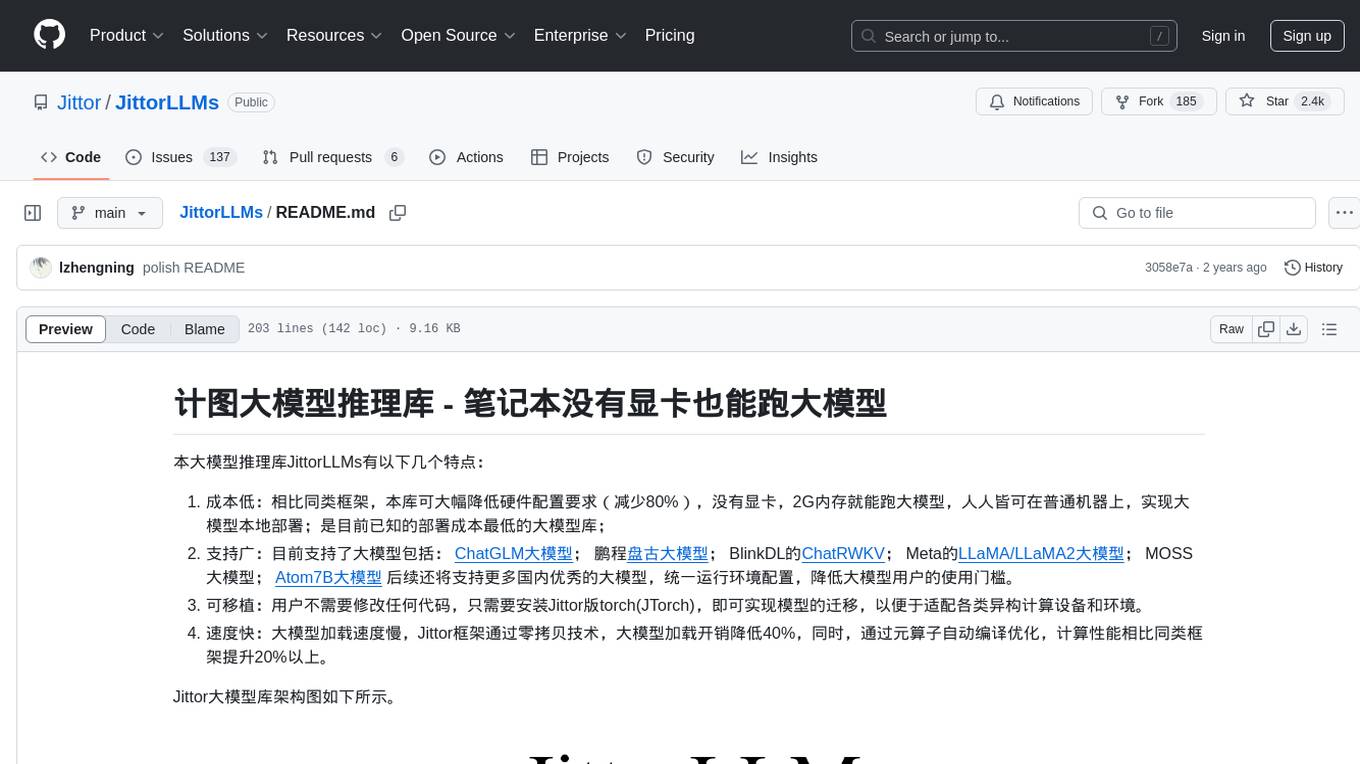
JittorLLMs
JittorLLMs is a large model inference library that allows running large models on machines with low hardware requirements. It significantly reduces hardware configuration demands, enabling deployment on ordinary machines with 2GB of memory. It supports various large models and provides a unified environment configuration for users. Users can easily migrate models without modifying any code by installing Jittor version of torch (JTorch). The framework offers fast model loading speed, optimized computation performance, and portability across different computing devices and environments.

motorhead
Motorhead is a memory and information retrieval server for LLMs. It provides three simple APIs to assist with memory handling in chat applications using LLMs. The first API, GET /sessions/:id/memory, returns messages up to a maximum window size. The second API, POST /sessions/:id/memory, allows you to send an array of messages to Motorhead for storage. The third API, DELETE /sessions/:id/memory, deletes the session's message list. Motorhead also features incremental summarization, where it processes half of the maximum window size of messages and summarizes them when the maximum is reached. Additionally, it supports searching by text query using vector search. Motorhead is configurable through environment variables, including the maximum window size, whether to enable long-term memory, the model used for incremental summarization, the server port, your OpenAI API key, and the Redis URL.
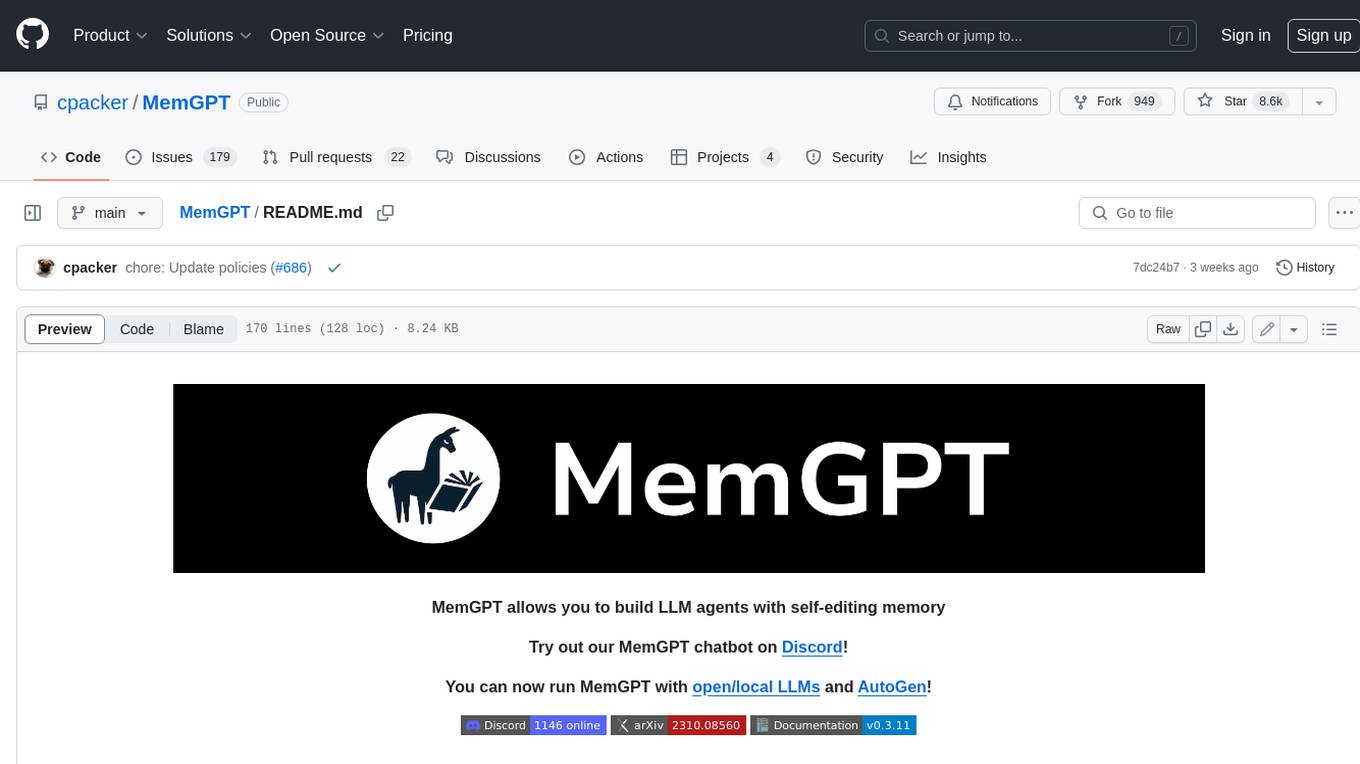
MemGPT
MemGPT is a system that intelligently manages different memory tiers in LLMs in order to effectively provide extended context within the LLM's limited context window. For example, MemGPT knows when to push critical information to a vector database and when to retrieve it later in the chat, enabling perpetual conversations. MemGPT can be used to create perpetual chatbots with self-editing memory, chat with your data by talking to your local files or SQL database, and more.
For similar jobs

sweep
Sweep is an AI junior developer that turns bugs and feature requests into code changes. It automatically handles developer experience improvements like adding type hints and improving test coverage.

teams-ai
The Teams AI Library is a software development kit (SDK) that helps developers create bots that can interact with Teams and Microsoft 365 applications. It is built on top of the Bot Framework SDK and simplifies the process of developing bots that interact with Teams' artificial intelligence capabilities. The SDK is available for JavaScript/TypeScript, .NET, and Python.

ai-guide
This guide is dedicated to Large Language Models (LLMs) that you can run on your home computer. It assumes your PC is a lower-end, non-gaming setup.

classifai
Supercharge WordPress Content Workflows and Engagement with Artificial Intelligence. Tap into leading cloud-based services like OpenAI, Microsoft Azure AI, Google Gemini and IBM Watson to augment your WordPress-powered websites. Publish content faster while improving SEO performance and increasing audience engagement. ClassifAI integrates Artificial Intelligence and Machine Learning technologies to lighten your workload and eliminate tedious tasks, giving you more time to create original content that matters.

chatbot-ui
Chatbot UI is an open-source AI chat app that allows users to create and deploy their own AI chatbots. It is easy to use and can be customized to fit any need. Chatbot UI is perfect for businesses, developers, and anyone who wants to create a chatbot.

BricksLLM
BricksLLM is a cloud native AI gateway written in Go. Currently, it provides native support for OpenAI, Anthropic, Azure OpenAI and vLLM. BricksLLM aims to provide enterprise level infrastructure that can power any LLM production use cases. Here are some use cases for BricksLLM: * Set LLM usage limits for users on different pricing tiers * Track LLM usage on a per user and per organization basis * Block or redact requests containing PIIs * Improve LLM reliability with failovers, retries and caching * Distribute API keys with rate limits and cost limits for internal development/production use cases * Distribute API keys with rate limits and cost limits for students

uAgents
uAgents is a Python library developed by Fetch.ai that allows for the creation of autonomous AI agents. These agents can perform various tasks on a schedule or take action on various events. uAgents are easy to create and manage, and they are connected to a fast-growing network of other uAgents. They are also secure, with cryptographically secured messages and wallets.

griptape
Griptape is a modular Python framework for building AI-powered applications that securely connect to your enterprise data and APIs. It offers developers the ability to maintain control and flexibility at every step. Griptape's core components include Structures (Agents, Pipelines, and Workflows), Tasks, Tools, Memory (Conversation Memory, Task Memory, and Meta Memory), Drivers (Prompt and Embedding Drivers, Vector Store Drivers, Image Generation Drivers, Image Query Drivers, SQL Drivers, Web Scraper Drivers, and Conversation Memory Drivers), Engines (Query Engines, Extraction Engines, Summary Engines, Image Generation Engines, and Image Query Engines), and additional components (Rulesets, Loaders, Artifacts, Chunkers, and Tokenizers). Griptape enables developers to create AI-powered applications with ease and efficiency.






